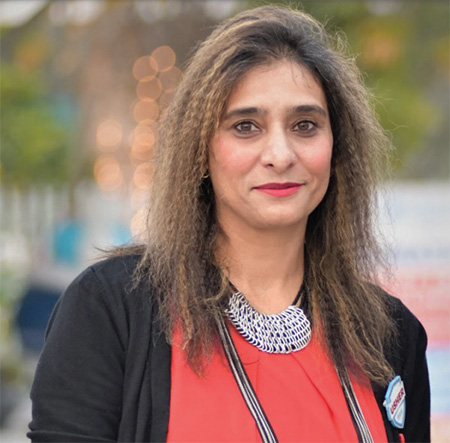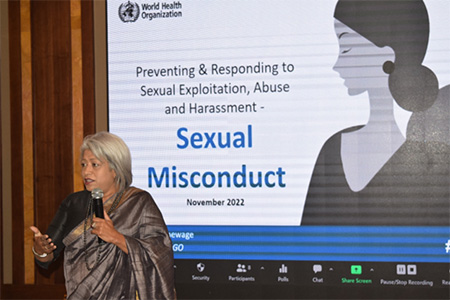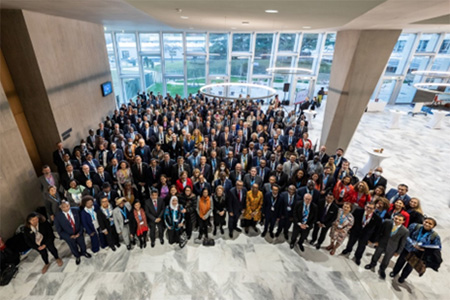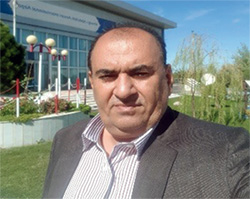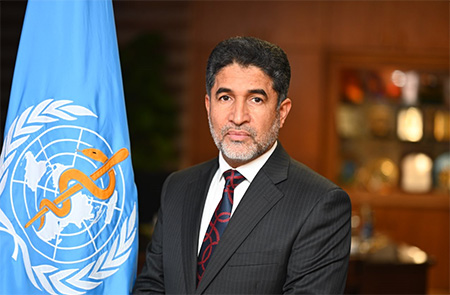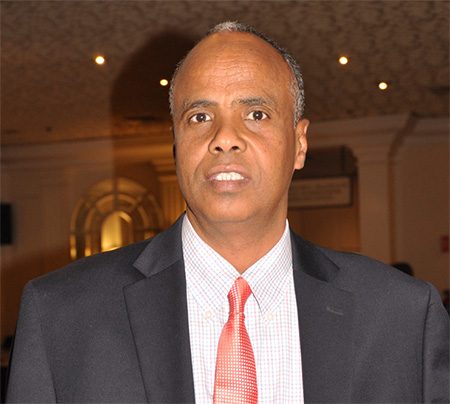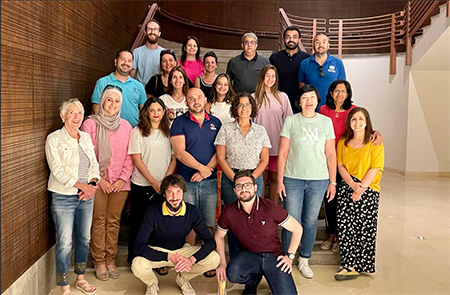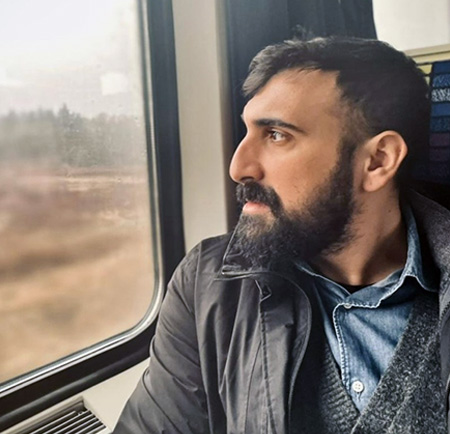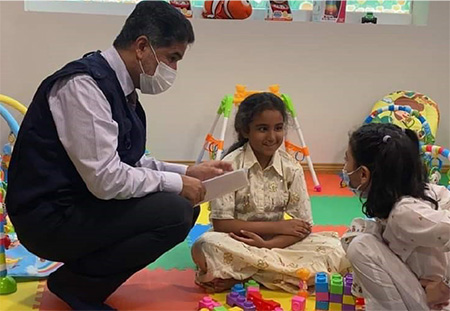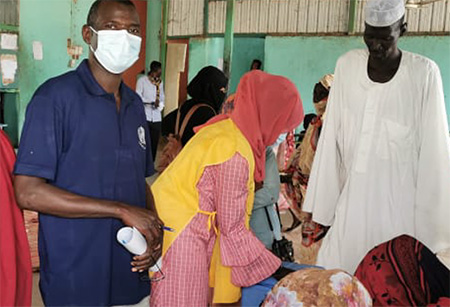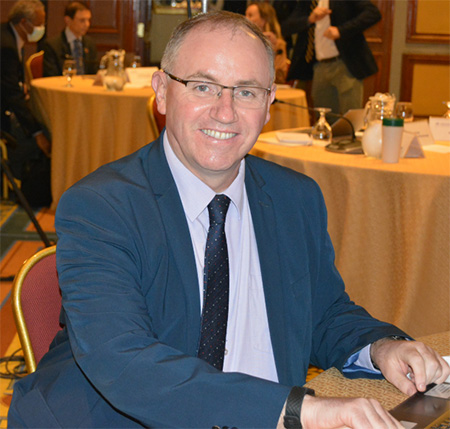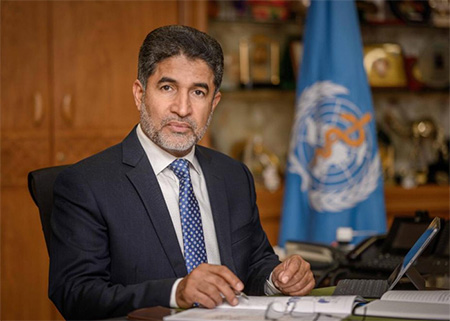07 Février 2023
As part of WHO’s ongoing Diversity, Equity and Inclusion (DEI) initiatives for a respectful workplace, Riffat Zahoor Abbasi, Pakistan country office receptionist and member of the Regional Office’s DEI regional catalyst group, speaks about the importance of tolerance, acceptance and empathy. Incorporating these three factors in our day-to-day work comes in many forms. As an international organization containing diverse personalities hailing from different backgrounds, Ms Abbasi thinks that an “empathy lens” should be put on prior to dealing with others during the day ahead. She adds that by looking inwards and practicing...
07 Février 2023
As consciousness of the issue of sexual misconduct has risen across WHO, Director of PRSEAH, Gaya Gamhewage, describes the key components that enable this form of misconduct and how the Organization is addressing it. Dr Gamhewage points to a lingering fear of reporting due to a perceived lack of consequences for misconduct, a lack of policy clarity and an exploitation of power dynamics as the primary enablers that pave the way for sexual misconduct in the workplace. As a result, many victims and survivors of it feel it is futile to...
07 Février 2023
In December 2022, the 11th Global Management Meeting (11GMM) took place at WHO headquarters in Geneva, Switzerland, after a four-year hiatus. The meeting involved WHO representatives, directors from headquarters and regional offices, regional directors and the Director-General, and took place under the overarching theme of “One WHO”. A key outcome was the agreement to develop and implement a plan of action, detailing concrete steps for implementation of the meeting’s recommendations, to significantly strengthen WHO’s presence and impact in countries. To take forward the implementation of the recommendations, as advised by the...
07 Février 2023
As a grade 3 emergency country, preventing and responding to sexual exploitation, abuse and harassment (PRSEAH) in Afghanistan is paramount across all areas of WHO’s work in Afghanistan to be able to effectively deliver on the ground. Respectful workplace focal point and National Professional Officer in the country, Sharifullah Haqmal, speaks on the importance of prioritizing PRSEAH within this context. He highlights that identifying focal points for local nongovernmental organizations and providing them with training, can bring WHO’s partners up to speed, empowering them to serve as active “upstanders”, and adds...
07 Février 2023
The “100-day challenge” was established to drive measurable impact in countries in a short period of time by encouraging the systematic and consistent use of data in the prioritization of WHO’s work. To realize this vision, nine country offices were selected from the different WHO regions to pilot the challenge, with Bahrain and the Islamic Republic of Iran as the two countries from our Region. Here, the WHO Representative to Bahrain, Dr Tasnim Atatrah, speaks to us about converting priorities into tangible results through the “100-day challenge”. Guided by recommendations from WHO...
02 Octobre 2022
La politique de la porte ouverte est essentielle pour maintenir un environnement de travail positif sous la direction du Dr Ahmed Al-Mandhari, Directeur régional de l'OMS pour la Méditerranée orientale. Une communication et une rétroinformation régulières avec la direction générale permettent au personnel et aux collègues de se sentir plus proches de l'Organisation. Le Dr Al-Mandhari réfléchit à la manière dont cette politique continue d'élargir sa vision et ses approches personnelles dans la perspective de créer un environnement accueillant au Bureau régional. Selon vous, comment la politique de la porte ouverte favorise-t-elle un environnement...
02 Octobre 2022
Maintenir l'élan du personnel pendant le processus de transformation est une composante essentielle de l'internalisation du changement, le but étant que la transformation devienne une partie intrinsèque de l'Organisation plutôt qu'un simple sujet d'intérêt. À cette fin, Mme Sabine Bhanot, spécialiste de la gestion du changement au sein des Écoles des cadres des Nations Unies (UNSSC), offre sa contribution pour la mise en œuvre de la réforme. Pour réaliser un changement efficace, S. Bhanot insiste sur la nécessité d'établir un cadre pour les jalons, de les reconnaître, et de célébrer les réalisations tout au long du...
02 Octobre 2022
Dr Abdinasir Abubakar, Responsable de la prévention des risques infectieux et de la préparation au Programme OMS de gestion des situations d'urgence sanitaire (WHE), réfléchit aux compétences et processus fondamentaux qu'il a appris en tant que chef de l'équipe d'appui à la gestion des incidents. Il décrit en quoi ces compétences lui ont permis d'accomplir son travail alors qu'il était Représentant de l'OMS par intérim au Liban. Ouverture d'esprit Doté de compétences fondamentales solides en leadership et techniques, l'ancien chef de l'équipe d'appui à la gestion des incidents pense que son ouverture d'esprit...
02 Octobre 2022
Motivé par la volonté de briser les cloisonnements, de réaligner sa communication et de veiller à ce que tout le personnel se sente entendu et en sécurité, le bureau de pays de l'OMS en Jordanie expérimente la première équipe de transformation de pays de la Région. Annonçant cette nouvelle ère de changement, le Dr Jamela Al-Raiby, Représentante de l'OMS en Jordanie, souligne le besoin urgent de reconnaître les lacunes et les défis en matière de communication. C'est pourquoi, après la ré-institution de l'équipe régionale de transformation, le bureau de pays de Jordanie s'est...
02 Octobre 2022
L'entretien de votre santé mentale et la création d'un bon équilibre entre vie professionnelle et vie privée impliquent de prêter attention à la fois aux facteurs organisationnels et individuels. Pour favoriser la santé mentale et le bien-être du personnel de l’OMS, le premier conseiller régional du personnel, M. Athanasios Chirvatidis, donne quelques exemples d’actions pratiques. Il explique qu'il est essentiel de se fixer des limites saines et de suivre un programme bien défini après sa journée de travail. Certains des problèmes auxquels le personnel peut être confronté comprennent les difficultés sur le...
09 Août 2022
WHO is making gender mainstreaming a priority across its offices in the Eastern Mediterranean Region. The Organization’s country office in Pakistan offers a good example. In June 2021, Regional Director Dr Ahmed Al-Mandhari and WHO Representative to Pakistan Dr Palitha Mahipala inaugurated a well-equipped daycare centre in the office to support all staff. The service is currently used by mainly female staff. Designed for children under-5 years of age, the new centre includes a breastfeeding room, an outdoor playground and more to accommodate their needs within a safe and secure environment. The...
09 Août 2022
Sudan faces multiple health challenges. Approximately 94% of the country’s people are not vaccinated against COVID-19, and its case-fatality ratio of 7.69% is among the highest in the Eastern Mediterranean Region. Simultaneously, it is confronting outbreaks of other communicable diseases such as dengue fever, malaria and hepatitis E. And a military coup in October 2021 added further uncertainty and complexity. While working with stakeholders to tackle these challenges, the country office in Sudan needed additional assistance to deal with essential administrative tasks towards the end of the biennium, including the closure...
09 Août 2022
Managers and staff are being urged to explore modalities of work that give staff opportunities to broaden their experience while helping WHO meet changing business needs. Surge support and short-term developmental assignments offer both immediate and long-term benefits to staff members and the Organization. Surge support is typically associated with emergencies and is used for acute events that require enlarged staff capacity for a duration of some months. Although travel restrictions were in place during the COVID-19 pandemic, surge support remained ongoing. Short-term developmental assignments provide opportunities to partake in a programme and/or...
09 Août 2022
The Regional Transformation Team has been reactivated with new members. The team is part of the overall Transformation structure initially established in July 2019, and the Regional Director issued a new circular in March 2022 to reinforce the Transformation structure. WHO Transformation seeks to revamp the Organization’s business models and systems and improve organizational culture and efficiency to ensure that it remains a catalyst for health and is accountable and fit for purpose. The regional Transformation team will work in close collaboration with the global Transformation team from WHO headquarters and...
09 Août 2022
Nous en sommes à notre quatrième année de transformation de l'OMS et restons déterminés à poursuivre ce processus. Accepter le changement dans la façon dont nous remplissons nos obligations dans la Région constitue une part essentielle de notre action visant à reconstruire des systèmes de santé plus équitables. Il nous reste encore beaucoup à faire. L'évaluation et la vérification des résultats menées en 2021 ont révélé que la transformation nécessitait des efforts supplémentaires dans notre Bureau régional et nos bureaux de pays. Ce thème a également été largement couvert lors des...





